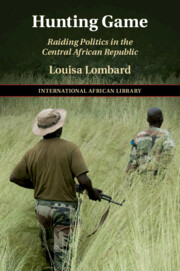Book contents
- Hunting Game
- The International African Library
- Hunting Game
- Copyright page
- Contents
- Figures
- Maps
- Acknowledgements
- Abbreviations and acronyms
- Map
- 1 Force, status, and uncertainty in the arts of acquisition
- 2 Zariba contests and collaborations
- 3 Manhunts persist in an unfortunate colony
- 4 Big-game hunting and regulatory sociality
- 5 The limits of law in coercive conservation
- 6 Camouflage skills
- 7 Denunciation and liberty
- 8 Force and status in rebellion
- 9 Sovereignty and distribution amid forceful acquisition
- References
- Index
- Titles in the series
6 - Camouflage skills
Published online by Cambridge University Press: 20 April 2020
- Hunting Game
- The International African Library
- Hunting Game
- Copyright page
- Contents
- Figures
- Maps
- Acknowledgements
- Abbreviations and acronyms
- Map
- 1 Force, status, and uncertainty in the arts of acquisition
- 2 Zariba contests and collaborations
- 3 Manhunts persist in an unfortunate colony
- 4 Big-game hunting and regulatory sociality
- 5 The limits of law in coercive conservation
- 6 Camouflage skills
- 7 Denunciation and liberty
- 8 Force and status in rebellion
- 9 Sovereignty and distribution amid forceful acquisition
- References
- Index
- Titles in the series
Summary
E. P. Thompson wisely noted that those who feel disenfranchised or otherwise disconnected from the law must defend their claims ‘by force or stealth’. But he left less explored what makes stealth work. To provide an insight, Chapter 6 investigates the plural, situational, and interpersonal ways in which people understand legitimate, or at least reasonable, access to taking in the hunting zone. Stealth, I argue, is less a matter of efficient hiding than of cultivating skills that allow blending in across different social and bureaucratic landscapes and greater access to their own acquisitive and status-related projects. I call these skills camouflage, in a nod to their hunter-like, non-pastoral tendencies. Camouflage is not just something state actors do in order to paper over the inconvenient or anomalous cases that might call attention to the limits of state ways of seeing. It is a skill that people develop in order to move in and out of institutional structures, a way to use those structures for their own gymnastic endeavours without drawing attention to the ways in which their practices cause the bars to creak or bend.
- Type
- Chapter
- Information
- Hunting GameRaiding Politics in the Central African Republic, pp. 146 - 166Publisher: Cambridge University PressPrint publication year: 2020

